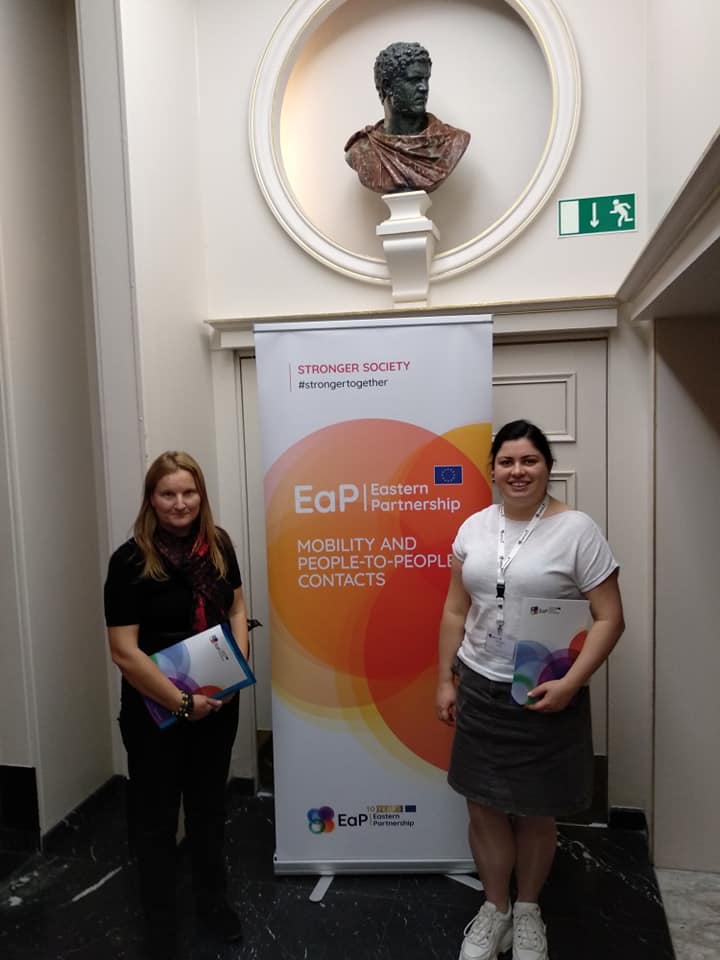Brussels, 30 September – 1 October 2019
Platform 4 Meeting on People to People Contacts
Sintija Bernava (EU Corodinator WG4, Donum Animus, Latvia) and Iryna Fedets (Institute for Economic Research and Policy Consulting, Ukraine) contributed to discussions on the future of the EaP post-2020 during the Platform 4 meeting on “Mobility and people-to-people” in Brussels.
Bernava and Fedets followed the discussion on the future of the Eastern Partnership in the areas covered by the Platform4 in view of the post-2020 agenda to be adopted at the Eastern Partnership Summit next year. The CSF representatives initiated a discussion regarding the progress and results on visa liberalization in the EaP countries and how visa liberalization is tied successfully to transparency and migration regulation, and how this tangible achievement can drive reform efforts from the point of view of public opinion. The CSF delegates emphasized that ordinary people in the EaP countries have very little knowledge about the visa liberalizationand how it can they benefit from it in their everyday life.
Furthermore, the delegates noted that progress regarding skills, entrepreneurship and employability of youth is lagging behind repeatedly in the EaP countries. Education reform is highly dependent on decentralization and educational autonomy. Bernava and Fedets described migration as an opportunity and a challenge: On the one hand, workforce emigration to the EU creates a lack of skills for local businesses in EaP countries. On the other hand, countries with high workforce migration, such as Ukraine, could use temporary emigration of their citizens to improve their skills and employability.
The CSF delegates concluded that increased media literacy has the potential to empower the young people in EaP countries and motivate them to support and strive for reforms in their home countries. Already now, SMEs and youth, are two of the most dynamic and reform oriented segments of EaP societies.
Recommendations
Each EaP state should
- strengthen investment in young people’s skills, entrepreneurship and employability.
- improve access to quality vocational education and training
- facilitate movement of people by making border crossings fast and accessible
- facilitating cross-border cooperation among enterprises and educational institutions to boost research and innovation
The EaP region should
- increase public participation in political processes and civic engagement at all levels
- developing its culture of collaboration amongst neighbours
- reduce border crossing time while increasing the effectiveness of control and exchange of information
The EU should
- enlarge its Erasmus offer with something like an “Erasmus East”- Program
- offer mentoring schemes through extended Erasmus+ 4YoungEntrepreneurs to cover all EaP countries
- highlight arts, culture and the creative economy as important sectors for EU investment into regional programmes.
- promote study exchange and training programs between the EaP countries and the EU member states
- continue the Creative Europe program or develop a similar one with focus on sustainable cross-border cooperation and mobility of creative professionals.
- encourage monitoring and evaluation of the implemented steps and programs
- facilitate civil society’s access to public documents and reports that describe the steps taken on national and local level in EaP countries.
- monitor the progress to reach and maintain visa liberalization conditionalities in EaP countries

Available for download
- Discussion paper with guiding questions
- Summary of inputs from structured consultation process – main elements related to Platform 4
- Draft Platform 4 Work Programme
